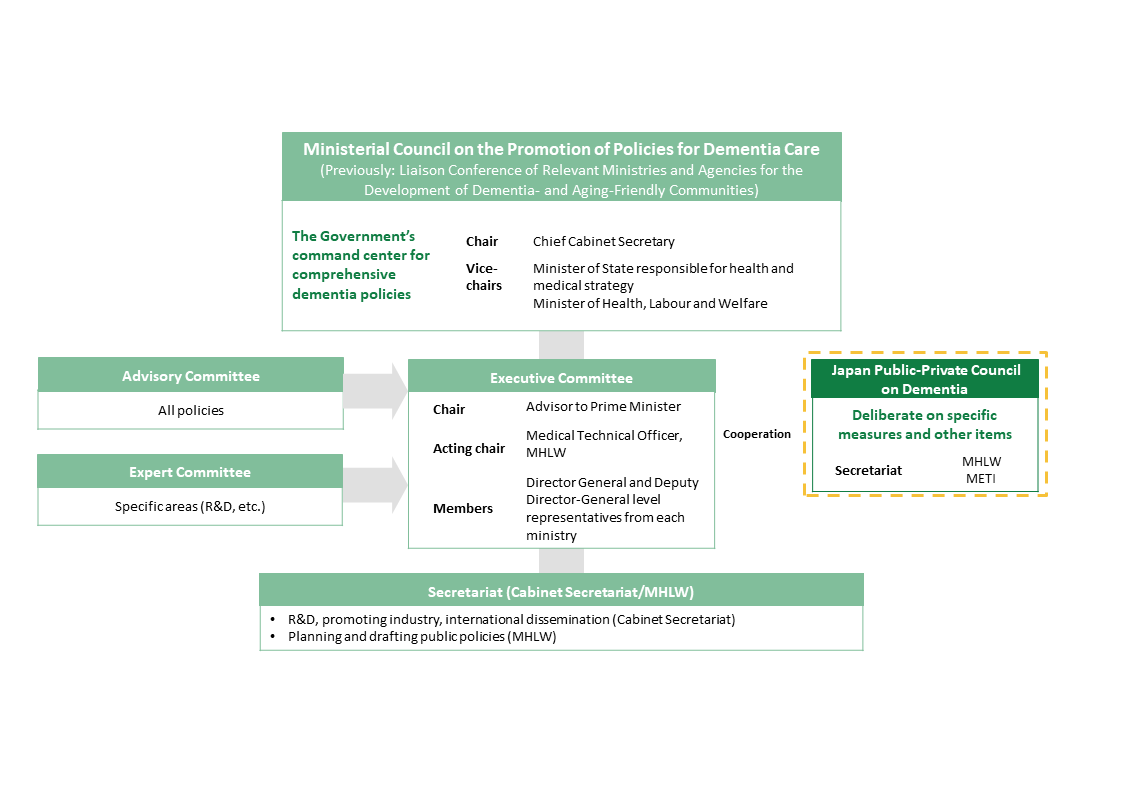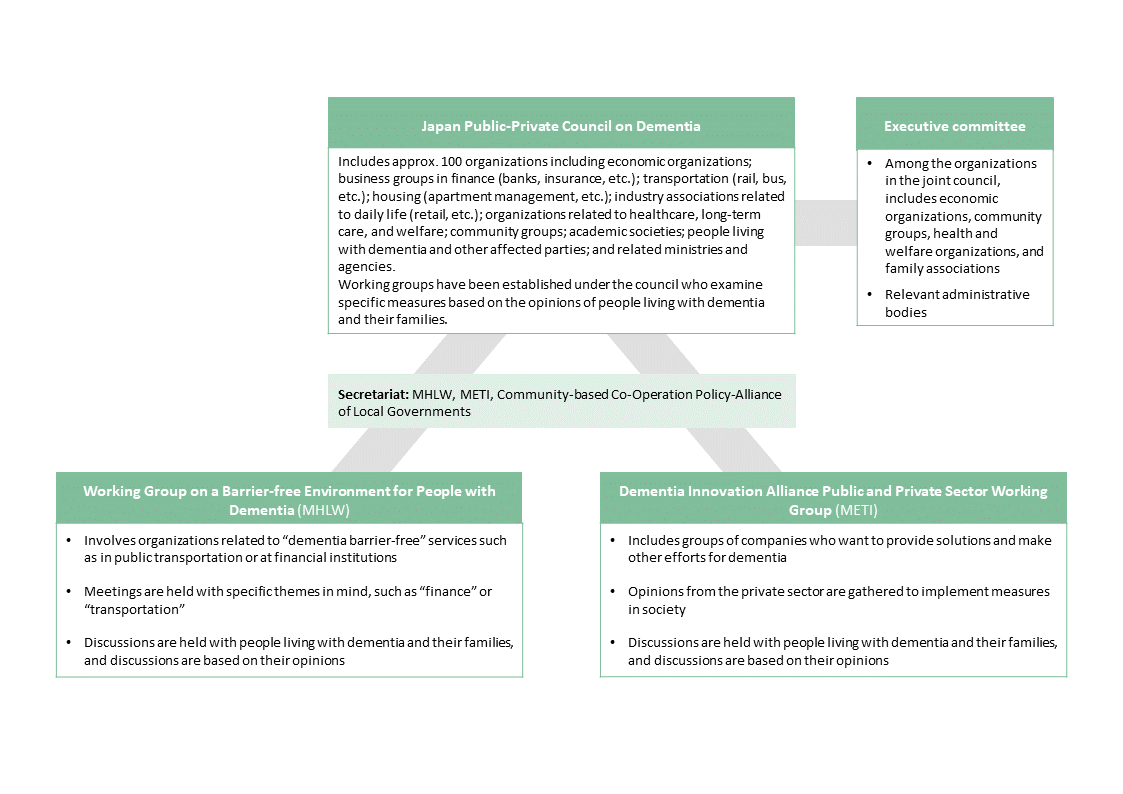The New Orange Plan was a major shift from the Orange Plan. Starting with the Ministry of Health, Labour and Welfare (MHLW), its joint signatories included the Cabinet Secretariat, the Cabinet Office, the National Police Agency, the Financial Services Agency, the Consumer Affairs Agency, the Ministry of Internal Affairs and Communications (MIC), the Ministry of Justice (MOJ), the Ministry of Education, Culture, Sports, Science and Technology (MEXT), the Ministry of Agriculture, Forestry and Fisheries (MAFF), the Ministry of Economy, Trade and Industry (METI), and the Ministry of Land, Infrastructure and Transport (MLIT). By creating a system for joint action spanning multiple ministries and agencies , the New Orange Plan made it possible to expand measures for dementia in fields other than healthcare, long-term care, and welfare policy.
An example of one such measure was “Growth Strategy 2018 – Reforms for Achieving ‘Society 5.0’ and a ‘Data-Driven Society,’” which was approved by the Cabinet in 2018. In addition to conventional medical research, Growth Strategy 2018 also demonstrated the Government’s intent to engage in public-private cooperation with a focus on fostering industries for supporting the daily lives of people living with dementia, saying “Local governments, researchers, companies and others are to cooperate and establish a testing ground for the production of new products and services that are ‘friendly to people with dementia,’ including livelihood support from very early prevention to creating an environment for livelihood support and social acceptance after onset. During the current fiscal year, we will create plans to develop frameworks for dementia research through public-private partnerships.” One item that may have been a significant influence on this was a study conducted by HGPI in FY2016 called “Research Project on the Construction and Use of a Model for an International Public-Private Partnership (PPP) in Dementia Research,” as well as the policy recommendations offered as part of that project in 2017. Following these developments, since 2018, the Japan Agency for Medical Research and Development (AMED) has been advancing concrete efforts to examine PPPs under the “Project for Establishing a Verification Infrastructure for Public-Private Innovation in Dementia Countermeasures,” which is mainly being funded by METI. The creation of systems for promoting measures that cut across ministries and agencies such as these has added to momentum for public-private collaboration by surpassing the conventional frameworks of policies for healthcare, long-term care, and welfare.
The Cabinet Secretariat then reorganized the Liaison Conference of Relevant Ministries and Agencies for the Development of Dementia- and Aging-Friendly Communities that had been in place since 2013 to establish the Ministerial Council on the Promotion of Policies for Dementia Care in December 2018. The intent of the new Council was to reinforce the system for promoting policies that span multiple ministries and agencies through stronger political leadership by having the Chief Cabinet Secretary serve as chair and Ministers of State serve as vice-chairs and in other roles. At the Advisor Meeting on Health and Medical Care Strategy held in 2014, Dr. Kiyoshi Kurokawa (who was participating as an advisor) proposed reinforcing systems for promoting policies that span multiple ministries, and we can assume that the decision to establish the aforementioned Ministerial Council was based on that statement and similar discussions.
The first meeting of the Ministerial Council in December 2018 set a target date of May or June 2019 for compiling the National Framework for Promotion of Dementia Policies (the “National Framework”). Various efforts to meet that target then began at each ministry and agency in earnest and included discussions at the Advisory Committee for the Promotion of Dementia Policies and at the Expert Committee for Promotion of Dementia Policies established under the Ministerial Council, as well as at the Executive Committee of the Ministerial Council on the Promotion of Policies for Dementia Care.
Chart 1

Source: Japan Public-Private Council on Dementia website (https://ninchisho-kanmin.or.jp/about.html). Accessed October 2022.
Later, in April 2019, the Japan Public-Private Council on Dementia was established to provide opportunities for the public and private sectors to discuss and consider concrete measures for dementia. This was also a decision made when the Ministerial Council was first established. As of March 2023, approximately 100 organizations were participating in the Japan Public-Private Council on Dementia. In addition to ministries, agencies, and local governments, its members include economic organizations; business groups in finance, transportation, housing, retail, lifestyle, IT, telecommunications, healthcare, long-term care, and welfare; and dementia-related academic societies and patient advocacy organizations. The MHLW, METI, and an NPO called the Community-based Co-Operation Policy-Alliance of Local Governments serve as its secretariat. Two working groups have been established under the Council, which are the Working Group on a Barrier-free Environment for People with Dementia (which is under the jurisdiction of the MHLW) and the Dementia Innovation Alliance Public and Private Sector Working Group (which is under the jurisdiction of METI). Discussions and projects based on each of their respective themes are now advancing.
Chart 2
 Source: Japan Public-Private Council on Dementia website (https://ninchisho-kanmin.or.jp/about.html). Accessed October 2022.
Source: Japan Public-Private Council on Dementia website (https://ninchisho-kanmin.or.jp/about.html). Accessed October 2022.

